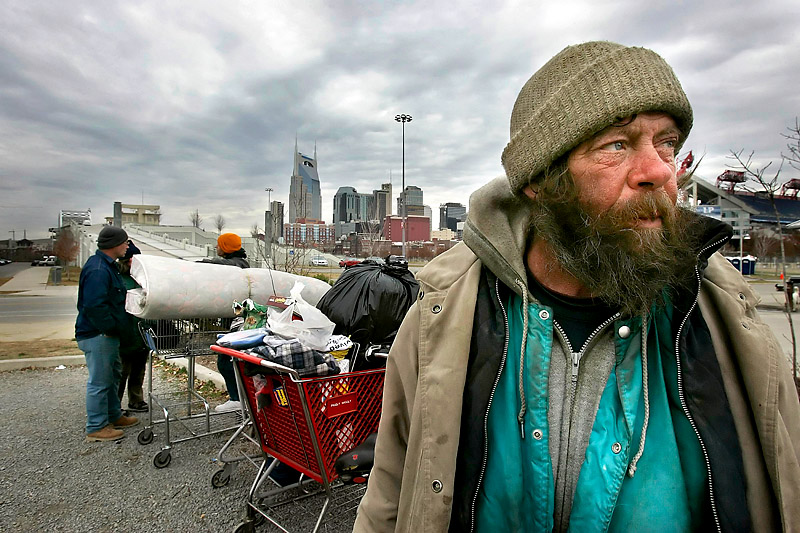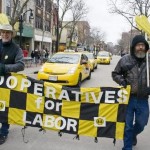[captionpix imgsrc=”https://pvnn.org/wp-content/uploads/2015/08/paulpoverty.png” captiontext=”Photo courtesy of downshoredrift.com”]
As the election cycle winds itself up in America, one issue is beginning to get noticed. The public does not want to hear about it, the media does not want to showcase it, and politicians who work for the people who run this country do not want to discuss the issue of poverty. The vendetta then is the overwhelming cycle of poverty into our country and the tendency of ignoring it and hope it will go away.
The media, always known to have a liberal bias, at most times in the history of our county has been well inclined to expose situations of poverty. Major news outlets would expose poverty, find the culprits, and even look for solutions. Yet that is no longer the case. Poverty is addressed on occasion, but in most cases it is ignored. The public suddenly sees images like those of people in West Virginia sitting in medical tents, as if they were refugees from the third world.
In many cases, the cause of Poverty in the United States stems from the loss of working class jobs. Indeed, people who work in factories are finding that jobs are no more. Other positions – service jobs, cashiers, cooks, truck drivers, customer service workers, janitors, etc. – are either closed shop to corrupt inward turning unions or offer such low wages that working full time will not guarantee survival. This of course encourages more people to give up.
The unemployment rate in the United States stands at 5.5 percent[ref]”News Release,” Bureau of Labor Statistics U.S. Department of Labor, August 7, 2015, accessed August 19, 2015.[/ref] However, this does not include the many people who have given up looking for work. Forty Five million people are below the poverty line.[ref]”Income, Poverty and Health Insurance Coverage in the U.S.: 2013,” U.S. Census Bureau, September 16, 2014, accessed August 19, 2015, http://www.census.gov/newsroom/press-releases/2014/cb14-169.html[/ref] One in five children receives foods stamps.[ref] “One in Five Children Receive Food Stamps, Census Bureau Reports,” U.S. Census Bureau, February 20, 2015, accessed August 19, 2015, http://www.census.gov/newsroom/press-releases/2015/cb15-16.html.[/ref] It seems that giving up is being encouraged, so other more fortunate people can ignore one less misfortune. Looking at the candidates for the Presidential election, for example, only Bernie sanders has mentioned poverty. In his recent speech in Los Angeles he spoke of the fact that families working full time needing to go to the “Food Shelf”, he also spoke of the “Tragedy” of youth unemployment and its’ connection to jail.[ref]Ibid[/ref] Scott Walker, the 45th Governor of Wisconsin and a candidate for the Republican Party’s nomination to the 2016 presidential election, mentioned examples of how to lift people out of poverty by helping people get the “education, and the skills and the qualifications” to do so. Other than Sanders, focus does not lie in the area of Poverty.[ref]Interview Fox News 7/30/15[/ref] The layers of poverty in the United States go very deep, and are buried by the people who do not want others to see it.
How is this happening? The truth is that the middle class is being squeezed from both sides. The Upper Middle Class, is jumping ship and mingling with the millionaires, while the lower Middle class, the blue collar side, is finding no work and falling into poverty. As much as it is denied, a middle class is a foundation in our society, not just economically, but for sense of having a down to earth, common sense, core group of people who want what is best for themselves, and the country. This, in turn, is detrimental to the corrupt power and unending wealth that adorns a small group. Without the middle class, wealthy people have to consistently worry about risk, losing their fortune and the like.
As all these horrors of poverty and misfortune worsen, the question needs to be asked, what can be done about this problem? The solutions should first focus on stopping the slide of many Americans into poverty. Media should make poverty a central theme again, so that the public is aware of the suffering around them. Next, politicians should address how to exactly halt the source of poverty – and stop the jobs from hemorrhaging out of the country, stop customers services wages from being drawn down by foreign help, or factory jobs stolen from China. Trade barriers should go up immediately, as to keep the jobs that are here, and possible bring some back.
A great deal of damage has already been done and many jobs see no prospects of return. The only solution is to create new positions. Incentives should be offered to companies and people to create jobs. Small businesses in their infancies should be promoted to expand and hire people. Business ideas should be given incentives to grow and become contributors to both the economy, increase the governments’ tax revenue and give people jobs. These two steps alone can steer the country away from disaster, helping to lessen the national debt and finally give people job.
It is no secret that employment and healthy income are the cornerstones of a secure economy, at least in capitalistic society. Without thoughtful, coordinated and consistent action, the current cycle will continue and lead the country to waters and shores that will be difficult if not impossible to turn back from. Action is something that needs to happen, with time working against us. Those who hold the real power in our country would be happy to have us ignore the issue and get to the point of no return. After all they are the happy ones and we are the sad ones, or maybe the other way around, but again idleness is the Devil’s playground.
Take Action:
Check out Feeding America, the nation’s largest domestic hunger-relief charity, with network members supplying food to more than twenty-five million Americans each year, and see how you can get involved.




